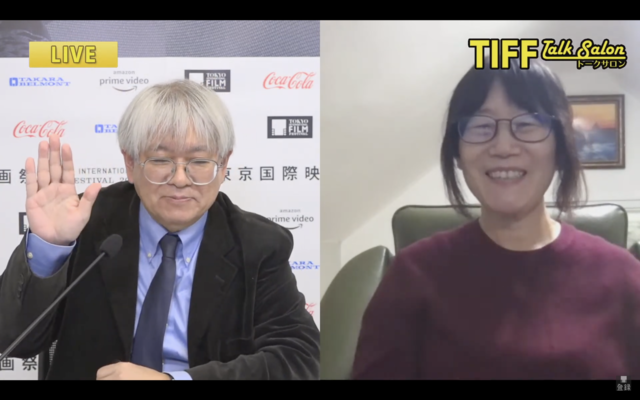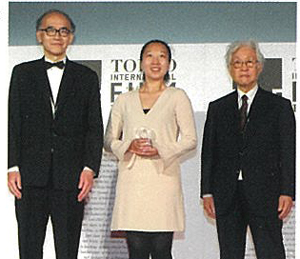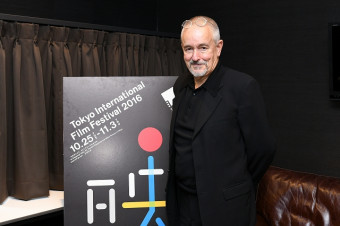
It’s easy to imagine that the film-director protagonist of Shin Su-won’s Hommage, which is screening in the Competition section of the 34th Tokyo International Film Festival, is Shin herself. There are a few stark differences: Kim Ji-wan (Lee Jung-eun) has made just three features in ten years, while Shin has made six during the same time period. Also, Shin has enjoyed critical and commercial success while the only indication that Kim made any kind of splash in the industry is a statuette on her shelf. But even that memento, she discovers, is losing its gold enamel.
As Shin has said she’s always apprehensive whenever she finishes a movie, wondering if it may be her last. It’s a natural fear for someone who makes personal, low-budget movies in an industry that is notoriously competitive. And in the first half-hour of Hommage, Shin has fun with this idea at Kim’s expense, showing the director and her hapless producer attending a public screening of her latest film in a nearly empty cineplex. The film is called Ghost Man, a title that even her own college-age son, Bo-ram (Tang Jun-sang), finds boring.
However, this title supplies Shin’s own film with a motif that sustains its theme about existing in a continuum of artistic endeavor. Broke, bullied by her husband to be more of a homemaker, and struggling with a new scenario, she takes a low-paying job for a “meaningful” project (“I’d rather have a high-paying job for a meaningless project,” she says to the initial offer): the restoration of the first Korean movie ever directed by a woman, which, in turn, happens to be about the first female judge in Korea.
Unfortunately, what remains of the film is missing much of its soundtrack and a number of scenes, so Kim has her work cut out for her. Hommage is part detective story, part ghost story, as Kim hunts down people who may have known the director or the lead actress. She finds two survivors, one of whom, an elderly woman living in a farmhouse, was a film editor at a time when women’s only input into the making of films was in front of the camera.
While Kim still deals with male micro-aggressions on a constant basis, she realizes she is standing on the shoulders of pioneers who have been almost completely forgotten—making her even more determined to restore the soundtrack and find the missing scenes, which were probably removed by censors.
But Hommage isn’t a feel-good movie about women proving their worth to no-account male chauvinists. There’s something subtler and more significant at play, a realization that someone’s life work won’t necessarily survive its creator, and that the work itself, accomplished in the here and now, is what it’s all about. Shin just wants to keep working, not so much because it’s her job, but because the job is who she is.
The end credits note that the story is based on real people, but the film’s relationship to the truth is “irrelevant;” which is to say Shin isn’t trying to recreate things the way they were, but rather how she imagines them, which is the right of an artist.
During the online Talk Salon Q&A with TIFF Programming Director Ichiyama Shozo, Shin, speaking from South Korea, explained that, indeed, much of the action in the film mirrored her own quest. After she finished her previous film and was looking for her next subject, she told him, an acquaintance referred her to a TV documentary about “women behind the cameras,” and she became fascinated with this small group of female filmmakers in the 1960s whom she’d never heard of. Researching further, she discovered that there was almost nothing tangible remaining of their work, so she had to imagine much of it, and in doing so she saw herself as part of the story. She had her movie.
But more than anything else, she said, it was the words of the only survivor of that cohort of women filmmakers, an editor, that made her realize Hommage was as much Shin’s story as it was these women’s: “She held my hand and told me I had to keep making movies.” Those women’s work may have been lost to time, but their legacy lives on.
TIFF TALK SALON: Competition
Hommage (Korea)
Guest: Shin Su-won (Director /Producer / Screenplay)


























